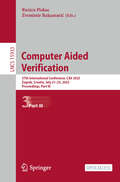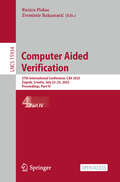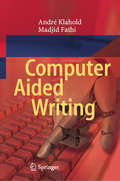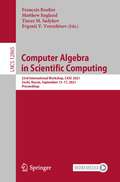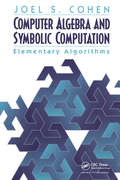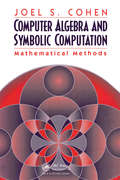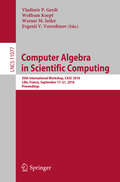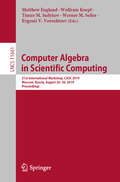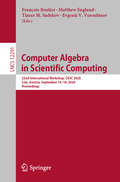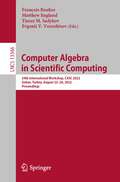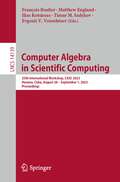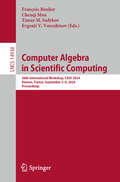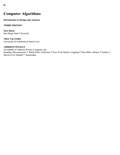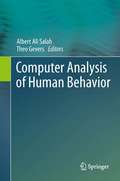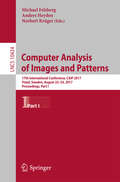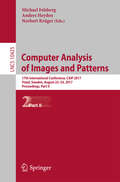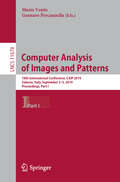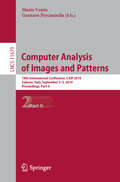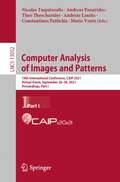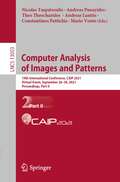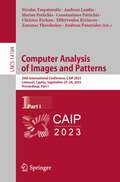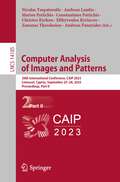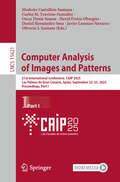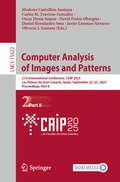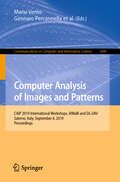- Table View
- List View
Computer Aided Verification: 37th International Conference, CAV 2025, Zagreb, Croatia, July 23-25, 2025, Proceedings, Part III (Lecture Notes in Computer Science #15933)
by Ruzica Piskac Zvonimir RakamarićThis open access 4-volume set constitutes the proceedings of the 37th International Conference on Computer Aided Verification, CAV 2025, held in Zagreb, Croatia, in July 23-25, 2025. The 51 regular papers presented together 24 tool papers, 4 casestudy papers in these proceedings were carefully reviewed and selected from 305 submissions. The accepted papers cover a wide spectrum of topics, from theoretical results to applications of formal methods. These papers apply or extend formal methods to a wide range of domains such as concurrency, machine learning and neural networks, quantum systems, as well as hybrid and stochastic systems.
Computer Aided Verification: 37th International Conference, CAV 2025, Zagreb, Croatia, July 23-25, 2025, Proceedings, Part IV (Lecture Notes in Computer Science #15934)
by Ruzica Piskac Zvonimir RakamarićThis open access 4-volume set constitutes the proceedings of the 37th International Conference on Computer Aided Verification, CAV 2025, held in Zagreb, Croatia, in July 23-25, 2025. The 51 regular papers presented together 24 tool papers, 4 casestudy papers in these proceedings were carefully reviewed and selected from 305 submissions. The accepted papers cover a wide spectrum of topics, from theoretical results to applications of formal methods. These papers apply or extend formal methods to a wide range of domains such as concurrency, machine learning and neural networks, quantum systems, as well as hybrid and stochastic systems.
Computer Aided Writing
by André Klahold Madjid FathiThis book deals with "Computer Aided Writing", CAW for short. The contents of that is a sector of Knowledge based technics and Knowledge Management. The role of Knowledge Management in social media, education and Industry 4.0 is out of question. More important is the expectation of combining Knowledge Management and Cognitive Technology, which needs more and more new innovations in this field to face recent problems in social and technological areas. The book is intended to provide an overview of the state of research in this field, show the extent to which computer assistance in writing is already being used and present current research contributions. After a brief introduction into the history of writing and the tools that were created, the current developments are examined on the basis of a formal writing model. Tools such as word processing and content management systems will be discussed in detail. The special form of writing, "journalism", is used to examine the effects of Computer Aided Writing. We dedicate a separate chapter to the topic of research, since it is of essential importance in the writing process. With Knowledge Discovery from Text (KDT) and recommendation systems we enter the field of Knowledge Management in the context of Computer Aided Writing. Finally, we will look at methods for automated text generation before giving a final outlook on future developments.
Computer Algebra in Scientific Computing: 23rd International Workshop, CASC 2021, Sochi, Russia, September 13–17, 2021, Proceedings (Lecture Notes in Computer Science #12865)
by Evgenii V. Vorozhtsov Matthew England Timur M. Sadykov François BoulierThis book constitutes the proceedings of the 23rd International Workshop on Computer Algebra in Scientific Computing, CASC 2021, held in Sochi, Russia, in September 2021. The 24 full papers presented together with 1 invited talk were carefully reviewed and selected from 40 submissions. The papers cover theoretical computer algebra and its applications in scientific computing.
Computer Algebra and Symbolic Computation: Elementary Algorithms
by Joel S. CohenThis book provides a systematic approach for the algorithmic formulation and implementation of mathematical operations in computer algebra programming languages. The viewpoint is that mathematical expressions, represented by expression trees, are the data objects of computer algebra programs, and by using a few primitive operations that analyze and
Computer Algebra and Symbolic Computation: Mathematical Methods
by Joel S. CohenMathematica, Maple, and similar software packages provide programs that carry out sophisticated mathematical operations. Applying the ideas introduced in Computer Algebra and Symbolic Computation: Elementary Algorithms, this book explores the application of algorithms to such methods as automatic simplification, polynomial decomposition, and polyno
Computer Algebra in Scientific Computing: 20th International Workshop, CASC 2018, Lille, France, September 17–21, 2018, Proceedings (Lecture Notes in Computer Science #11077)
by Wolfram Koepf Vladimir P. Gerdt Werner M. Seiler Evgenii V. VorozhtsovThis book constitutes the proceedings of the 20th International Workshop on Computer Algebra in Scientific Computing, CASC 2018, held in Lille, France, in September 2018. The 24 full papers of this volume presented with an abstract of an invited talk and one paper corresponding to another invited talk were carefully reviewed and selected from 29 submissions. They deal with cutting-edge research in all major disciplines of computer algebra in sciences such as physics, chemistry, life sciences, and engineering.Chapter “Positive Solutions of Systems of Signed Parametric Polynomial Inequalities” is available open access under a Creative Commons Attribution 4.0 International License via link.springer.com.
Computer Algebra in Scientific Computing: 21st International Workshop, CASC 2019, Moscow, Russia, August 26–30, 2019, Proceedings (Lecture Notes in Computer Science #11661)
by Wolfram Koepf Werner M. Seiler Evgenii V. Vorozhtsov Matthew England Timur M. SadykovThis book constitutes the refereed proceedings of the 21st International Workshop on Computer Algebra in Scientific Computing, CASC 2019, held in Moscow, Russia, in August 2019.The 28 full papers presented together with 2 invited talks were carefully reviewed and selected from 44 submissions. They deal with cutting-edge research in all major disciplines of computer algebra. The papers cover topics such as polynomial algebra, symbolic and symbolic-numerical computation, applications of symbolic computation for investigating and solving ordinary differential equations, applications of CASs in the investigation and solution of celestial mechanics problems, and in mechanics, physics, and robotics.
Computer Algebra in Scientific Computing: 22nd International Workshop, CASC 2020, Linz, Austria, September 14–18, 2020, Proceedings (Lecture Notes in Computer Science #12291)
by Evgenii V. Vorozhtsov Matthew England Timur M. Sadykov François BoulierThis book constitutes the refereed proceedings of the 22nd International Workshop on Computer Algebra in Scientific Computing, CASC 2020, held in Linz, Austria, in September 2020. The conference was held virtually due to the COVID-19 pandemic.The 34 full papers presented together with 2 invited talks were carefully reviewed and selected from 41 submissions. They deal with cutting-edge research in all major disciplines of computer algebra. The papers cover topics such as polynomial algebra, symbolic and symbolic-numerical computation, applications of symbolic computation for investigating and solving ordinary differential equations, applications of CAS in the investigation and solution of celestial mechanics problems, and in mechanics, physics, and robotics.
Computer Algebra in Scientific Computing: 24th International Workshop, CASC 2022, Gebze, Turkey, August 22–26, 2022, Proceedings (Lecture Notes in Computer Science #13366)
by Evgenii V. Vorozhtsov Matthew England Timur M. Sadykov François BoulierThis book constitutes the proceedings of the 24th International Workshop on Computer Algebra in Scientific Computing, CASC 2022, which took place in Gebze, Turkey, in August 2022. The 20 full papers included in this book were carefully reviewed and selected from 32 submissions. They focus on the theory of symbolic computation and its implementation in computer algebra systems as well as all other areas of scientific computing with regard to their benefit from or use of computer algebra methods and software.
Computer Algebra in Scientific Computing: 25th International Workshop, CASC 2023, Havana, Cuba, August 28 – September 1, 2023, Proceedings (Lecture Notes in Computer Science #14139)
by Evgenii V. Vorozhtsov Matthew England Ilias Kotsireas Timur M. Sadykov François BoulierThis book constitutes the refereed proceedings of the 25th International Workshop on Computer Algebra in Scientific Computing, CASC 2023, which took place in Havana, Cuba, during August 28-September 1, 2023.The 22 full papers included in this book were carefully reviewed and selected from 29 submissions. They focus on the theory of symbolic computation and its implementation in computer algebra systems as well as all other areas of scientific computing with regard to their benefit from or use of computer algebra methods and software.
Computer Algebra in Scientific Computing: 26th International Workshop, CASC 2024, Rennes, France, September 2–6, 2024, Proceedings (Lecture Notes in Computer Science #14938)
by Evgenii V. Vorozhtsov Timur M. Sadykov François Boulier Chenqi MouThis book constitutes the refereed proceedings of the 26th International Workshop on Computer Algebra in Scientific Computing, CASC 2024, which took place in Rennes, France, during September 2 - September 6, 2024. The 19 full papers included in this book were carefully reviewed and selected from 23 submissions. The annual International Workshop CASC 2024 aims to bring together researchers in theoretical computer algebra (CA), engineers, scholars, as well as other allied professionals applying CA tools for solving problems in industry and in various branches of scientific computing to explore and discuss advancements, challenges, and innovations related to CA.
Computer Algorithms: Introduction to Design and Analysis
by Sara Baase Allen Van GelderDrawing upon combined decades of teaching experience, Professors Sara Baase and Allen Van Gelder have extensively revised this best seller to make it the most current and accessible choice for any algorithms course. <p><p>The new Third Edition features the addition of new topics and exercises and an increased emphasis on algorithm design techniques such as divide-and-conquer and greedy algorithms. It continues the tradition of solid mathematical analysis and clear writing style that made it so popular in previous editions.
Computer Analysis of Human Behavior
by Theo Gevers Albert Ali SalahThis book provides a broad survey of advanced pattern recognition techniques for human behavior analysis. Clearly structured, the book begins with concise coverage of the major concepts, before introducing the most frequently used techniques and algorithms in detail, and then discussing examples of real applications. Features: contains contributions from an international selection of experts in the field; presents a thorough introduction to the fundamental topics of human behavior analysis; investigates methods for activity recognition, including gait and posture analysis, hand gesture analysis, and semantics of human behavior in image sequences; provides an accessible psychological treatise on social signals for the analysis of social behaviors; discusses voice and speech analysis, combined audiovisual cues, and social interactions and group dynamics; examines applications in different research fields; each chapter concludes with review questions, a summary of the topics covered, and a glossary.
Computer Analysis of Images and Patterns: 17th International Conference, CAIP 2017, Ystad, Sweden, August 22-24, 2017, Proceedings, Part I (Lecture Notes in Computer Science #10424)
by Michael Felsberg Anders Heyden Norbert KrügerThe two volume set LNCS 10424 and 10425 constitutes the refereed proceedings of the 17th International Conference on Computer Analysis of Images and Patterns, CAIP 2017, held in Ystad, Sweden, in August 2017. The 72 papers presented were carefully reviewed and selected from 144 submissions The papers are organized in the following topical sections: Vision for Robotics; Motion and Tracking; Segmentation; Image/Video Indexing and Retrieval; Shape Representation and Analysis; Biomedical Image Analysis; Biometrics; Machine Learning; Image Restoration; and Poster Sessions.
Computer Analysis of Images and Patterns: 17th International Conference, CAIP 2017, Ystad, Sweden, August 22-24, 2017, Proceedings, Part II (Lecture Notes in Computer Science #10425)
by Michael Felsberg Anders Heyden Norbert KrügerThe two volume set LNCS 10424 and 10425 constitutes the refereed proceedings of the 17th International Conference on Computer Analysis of Images and Patterns, CAIP 2017, held in Ystad, Sweden, in August 2017. The 72 papers presented were carefully reviewed and selected from 144 submissions The papers are organized in the following topical sections: Vision for Robotics; Motion and Tracking; Segmentation; Image/Video Indexing and Retrieval; Shape Representation and Analysis; Biomedical Image Analysis; Biometrics; Machine Learning; Image Restoration; and Poster Sessions.
Computer Analysis of Images and Patterns: 18th International Conference, CAIP 2019, Salerno, Italy, September 3–5, 2019, Proceedings, Part I (Lecture Notes in Computer Science #11678)
by Mario Vento Gennaro PercannellaThe two volume set LNCS 11678 and 11679 constitutes the refereed proceedings of the 18th International Conference on Computer Analysis of Images and Patterns, CAIP 2019, held in Salerno, Italy, in September 2019. The 106 papers presented were carefully reviewed and selected from 176 submissions The papers are organized in the following topical sections: Intelligent Systems; Real-time and GPU Processing; Image Segmentation; Image and Texture Analysis; Machine Learning for Image and Pattern Analysis; Data Sets and Benchmarks; Structural and Computational Pattern Recognition; Posters.
Computer Analysis of Images and Patterns: 18th International Conference, CAIP 2019, Salerno, Italy, September 3–5, 2019, Proceedings, Part II (Lecture Notes in Computer Science #11679)
by Mario Vento Gennaro PercannellaThe two volume set LNCS 11678 and 11679 constitutes the refereed proceedings of the 18th International Conference on Computer Analysis of Images and Patterns, CAIP 2019, held in Salerno, Italy, in September 2019. The 106 papers presented were carefully reviewed and selected from 176 submissions The papers are organized in the following topical sections: Intelligent Systems; Real-time and GPU Processing; Image Segmentation; Image and Texture Analysis; Machine Learning for Image and Pattern Analysis; Data Sets and Benchmarks; Structural and Computational Pattern Recognition; Posters.
Computer Analysis of Images and Patterns: 19th International Conference, CAIP 2021, Virtual Event, September 28–30, 2021, Proceedings, Part I (Lecture Notes in Computer Science #13052)
by Mario Vento Nicolas Tsapatsoulis Andreas Panayides Theo Theocharides Andreas Lanitis Constantinos PattichisThe two volume set LNCS 13052 and 13053 constitutes the refereed proceedings of the 19th International Conference on Computer Analysis of Images and Patterns, CAIP 2021, held virtually, in September 2021. The 87 papers presented were carefully reviewed and selected from 129 submissions. The papers are organized in the following topical sections across the 2 volumes: 3D vision, biomedical image and pattern analysis; machine learning; feature extractions; object recognition; face and gesture, guess the age contest, biometrics, cryptography and security; and segmentation and image restoration.
Computer Analysis of Images and Patterns: 19th International Conference, CAIP 2021, Virtual Event, September 28–30, 2021, Proceedings, Part II (Lecture Notes in Computer Science #13053)
by Mario Vento Nicolas Tsapatsoulis Andreas Panayides Theo Theocharides Andreas Lanitis Constantinos PattichisThe two volume set LNCS 13052 and 13053 constitutes the refereed proceedings of the 19th International Conference on Computer Analysis of Images and Patterns, CAIP 2021, held virtually, in September 2021. The 87 papers presented were carefully reviewed and selected from 129 submissions. The papers are organized in the following topical sections across the 2 volumes: 3D vision, biomedical image and pattern analysis; machine learning; feature extractions; object recognition; face and gesture, guess the age contest, biometrics, cryptography and security; and segmentation and image restoration.
Computer Analysis of Images and Patterns: 20th International Conference, CAIP 2023, Limassol, Cyprus, September 25–28, 2023, Proceedings, Part I (Lecture Notes in Computer Science #14184)
by Efthyvoulos Kyriacou Nicolas Tsapatsoulis Andreas Panayides Andreas Lanitis Constantinos Pattichis Marios Pattichis Christos Kyrkou Zenonas TheodosiouThis volume LNCS 14184 and 14185 constitutes the refereed proceedings of the 20th International Conference, CAIP 2023, in Limassol, Cyprus, in September 2023. The 54 full papers presented were carefully reviewed and selected from 67 submissions. They were organized in the following section as follows:Part I-:PAR Contest 2023; Deep Learning; Machine Learning for Image and Pattern Analysis; and Object Recognition and Segmentation.Part II : Biometrics- Human Pose Estimation- Action Recognition; Biomedical Image and Pattern Analysis; and General Vision- AI Applications.
Computer Analysis of Images and Patterns: 20th International Conference, CAIP 2023, Limassol, Cyprus, September 25–28, 2023, Proceedings, Part II (Lecture Notes in Computer Science #14185)
by Efthyvoulos Kyriacou Nicolas Tsapatsoulis Andreas Panayides Andreas Lanitis Constantinos Pattichis Marios Pattichis Christos Kyrkou Zenonas TheodosiouThis volume LNCS 14184 and 14185 constitutes the refereed proceedings of the 20th International Conference, CAIP 2023, in Limassol, Cyprus, in September 2023. The 54 full papers presented were carefully reviewed and selected from 67 submissions. They were organized in the following section as follows:Part I: PAR Contest 2023; Deep Learning; Machine Learning for Image and Pattern Analysis; and Object Recognition and Segmentation.Part II : Biometrics- Human Pose Estimation- Action Recognition; Biomedical Image and Pattern Analysis; and General Vision- AI Applications.
Computer Analysis of Images and Patterns: 21st International Conference, CAIP 2025, Las Palmas de Gran Canaria, Spain, September 22–25, 2025, Proceedings, Part I (Lecture Notes in Computer Science #15621)
by Oscar Deniz Suarez Carlos M. Travieso-González Modesto Castrillón-Santana David Freire-Obregón Daniel Hernández-Sosa Javier Lorenzo-Navarro Oliverio J. SantanaThe volume set LNCS 15621-15622 constitutes the refereed proceedings of the 21st International Conference on Computer Analysis of Images and Patterns, CAIP 2025, which took place in Las Palmas de Gran Canaria, Spain, during September 22-25, 2025. The 65 full papers were carefully reviewed and selected from 109 submissions. The proceedings focus on Facial and Video Recognition, Image Segmentation, Object Detection and Applications, 3D Vision and Reconstruction, Biomedical Imaging and Diagnostics, Model Robustness and Generalization, Multimodal and Vision-Language Models, Robotics, Interaction and Intelligent Systems, Emerging Methods and Vision Applications.
Computer Analysis of Images and Patterns: 21st International Conference, CAIP 2025, Las Palmas de Gran Canaria, Spain, September 22–25, 2025, Proceedings, Part II (Lecture Notes in Computer Science #15622)
by Oscar Deniz Suarez Carlos M. Travieso-González Modesto Castrillón-Santana David Freire-Obregón Daniel Hernández-Sosa Javier Lorenzo-Navarro Oliverio J. SantanaThe volume set LNCS 15621-15622 constitutes the refereed proceedings of the 21st International Conference on Computer Analysis of Images and Patterns, CAIP 2025, which took place in Las Palmas de Gran Canaria, Spain, during September 22-25, 2025. The 65 full papers were carefully reviewed and selected from 109 submissions. The proceedings focus on Facial and Video Recognition, Image Segmentation, Object Detection and Applications, 3D Vision and Reconstruction, Biomedical Imaging and Diagnostics, Model Robustness and Generalization, Multimodal and Vision-Language Models, Robotics, Interaction and Intelligent Systems, Emerging Methods and Vision Applications.
Computer Analysis of Images and Patterns: CAIP 2019 International Workshops, ViMaBi and DL-UAV, Salerno, Italy, September 6, 2019, Proceedings (Communications in Computer and Information Science #1089)
by Mario Vento Gennaro Percannella Sara Colantonio Daniela Giorgi Bogdan J. Matuszewski Hamideh Kerdegari Manzoor RazaakThis book constitutes the refereed proceedings of two workshops held at the 18th International Conference on Computer Analysis of Images and Patterns, CAIP 2019, held in Salerno, Italy, in September 2019: First Workshop on Deep-learning based Computer Vision for UAV, DL-UAV 2019, and the First Workshop on Visual Computing and Machine Learning for Biomedical Applications, ViMaBi 2019. The 12 papers presented in this volume were carefully reviewed and selected from 16 submissions and focus on all aspects of visual computing and machine learning for biomedical applications, and deep-learning based computer vision for UAV.
